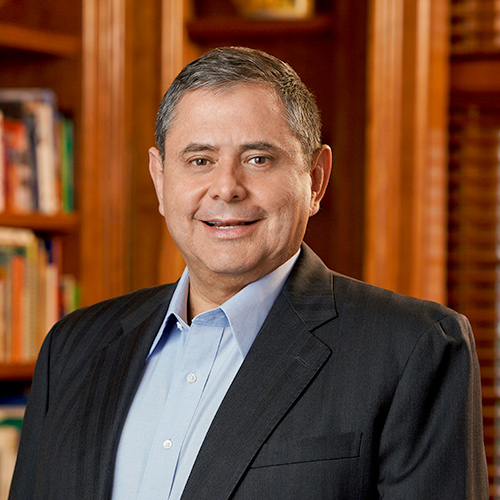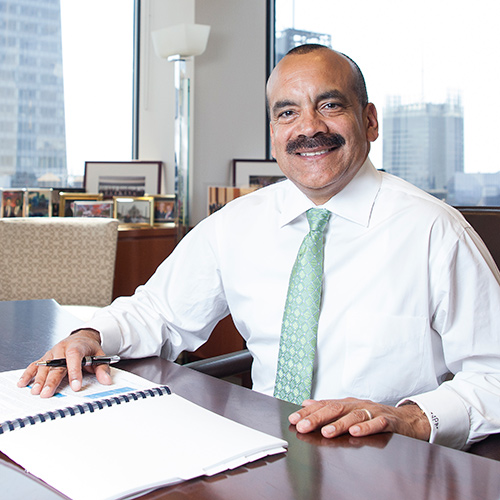Over his twenty-two years with Chick-fil-A, senior director of real estate Alex Dominguez discovered a deep passion for philanthropic work. In addition to being master of the real-estate domain, having represented everything from large retail centers to mobile home parks, Dominguez has directed his energy towards helping homeless and disadvantaged individuals. Here, the senior director talks to HE about his humble beginnings in Cuba and his philanthropic work with City of Refuge.
HE: How has the way you were raised impacted your work ethic?
We left Cuba in 1968 with only the clothes on our backs. In the United States, there were fourteen of us living in my aunt’s two-bedroom house. My father worked sixty to seventy hours a week, and on his first-ever vacation he took us to Sears to buy a lawn mower and an edger so that during his “free time” we could have our own landscaping business. My mom worked from home as a seamstress and homemaker. My parents spent their whole lives working; so much of my work ethic comes from my parents. When I was younger, it was also rooted in survival, the understanding that I had to work harder because I was already at a disadvantage because I wasn’t from this country, I didn’t speak the language, and I was from the wrong neighborhood.
Were you interested in real estate before graduating from college and starting your career?
Not really, but the idea of having land or owning land is something that always interested me, and it’s something I thought about a lot growing up. I grew up on a farm in Cuba, born around the time Castro took over the island. I was born into the communist revolution. My dad had a grocery store, a five and dime, a cattle farm, and a dairy farm before everything was nationalized, so he lost it all. I did the math once; I think it was nearly $700 billion in real estate that became the property of the government. In college, I was honestly more focused on playing football than studying, but a real estate 101 class changed everything. It gave me the focus I was searching for.
What do you enjoy most about your work as senior director of real estate?
No matter how many deals I do, there are never two that are similar. I’m always dealing with new people, and their personalities are difficult or easy-going or anywhere in between. Every acre, every piece of earth is different. Codes are different in every city, county, and state. It never gets old.
You do a great deal of philanthropic work, including working with City of Refuge, a non-profit dedicated to bringing transformation to individuals and communities in need. How did you get involved?
My wife Jaynie called me one day and said a neighbor had all of her things dumped out into her front yard. My better half is very conscious of others and she wanted to do something to help after we found our neighbor had been living without water or electricity. While searching for a place that could help our neighbor, Jaynie came across City of Refuge, which is a homeless shelter that also provides medical services and opportunities for employment through the 180° Kitchen, a culinary arts training program led by three amazing chefs, one of whom cooked for two presidents. Our work with the organization started with our neighbor and has since branched out.
What other programs are offered by the organization?
City of Refuge’s transformation pathway includes programs that stretch from family formation through re-stabilizing adults. There are quite a few education, character development, and college prep programs for youth and children.
One of its projects, the Kindred Spirit Home, is amazing. It provides housing for teen moms and teaches parenting skills. There is also a program that provides assistance to victims of sex trafficking, including long-term, trauma-informed care.
The home’s NAPA Training Center is an auto-technician training program made possible by a $300,000 donation from NAPA; it guarantees a job upon graduation. City of Refuge also has a full medical clinic, a middle and high school, and a pre-K program that supports both residents and community members.
What is your biggest takeaway from doing this work?
I’ve become very passionate about the concept of collective impact, which is essentially when multiple ministries come together to solve a problem by focusing on the same end goal. City of Refuge offers housing, medical services, job training, and educational opportunities, which is a more common-sense approach than exclusively offering services for one thing.
My ultimate goal is to create a social innovation hub in Atlanta where multiple organizations working together can meet the needs of those most in need. It would be a way to create real change.

